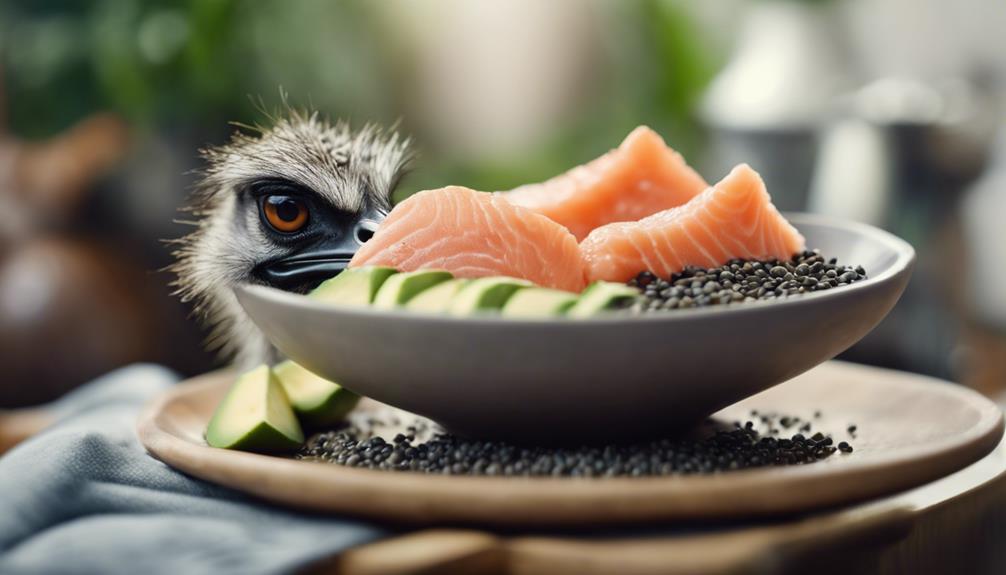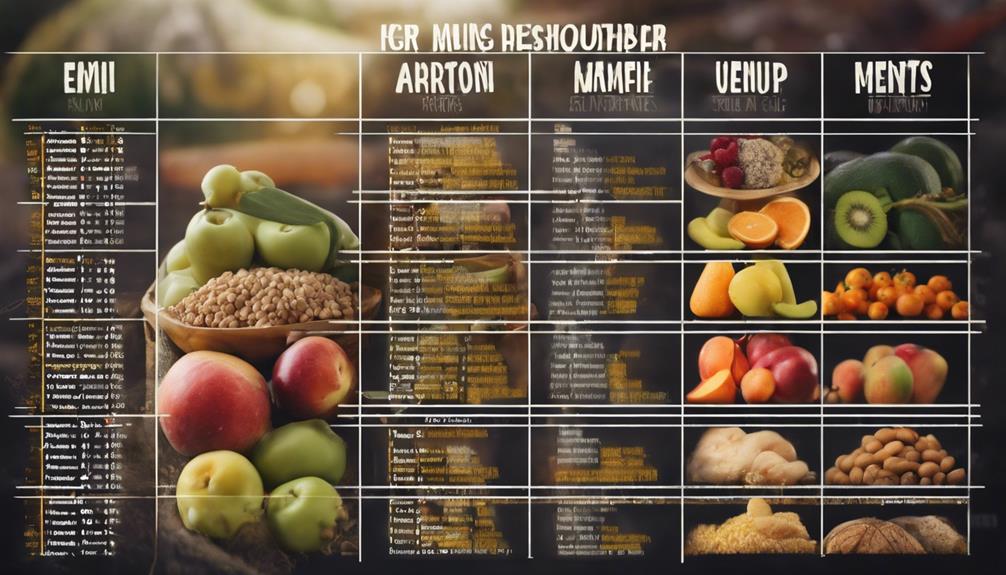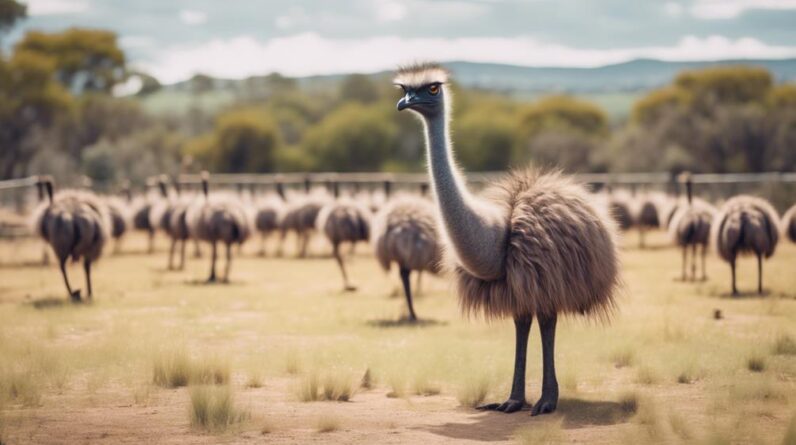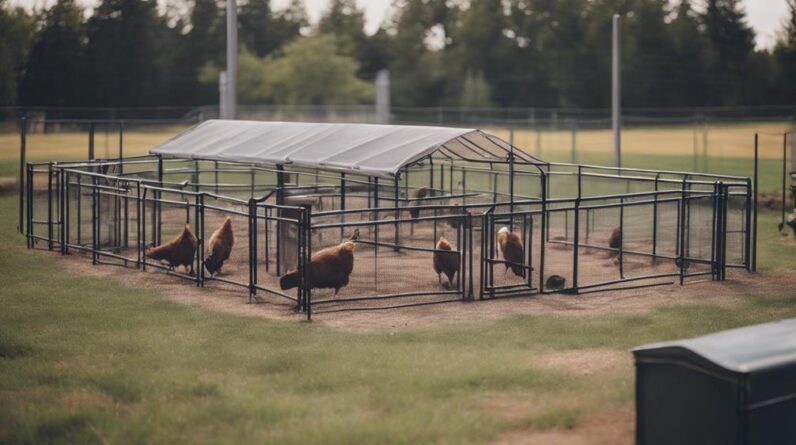
So, you've decided to feed your emu whatever you find lying around the yard, thinking, 'Hey, they're birds, they'll eat anything, right?'
Well, let's just say that might not be the best approach for optimal health. Emus have specific dietary requirements that play a crucial role in their overall well-being.
But what exactly should you be feeding your emu to ensure it stays healthy and happy? Let's explore some key guidelines to help you navigate the world of emu nutrition.
Key Takeaways
- Emus require a high-fiber diet mimicking their natural grazing habits for optimal digestion.
- Balanced nutrition with diverse sources of protein, vitamins, and healthy fats is crucial.
- Monitoring diet, avoiding toxic plants, and consulting a vet ensure their health and well-being.
- Adjusting seasonal diets and incorporating vet-recommended supplements support emus' overall health.
Emu Dietary Requirements

To ensure optimal health and growth of emus, their dietary requirements must be carefully balanced and monitored. Understanding the intricacies of the emu digestive system is crucial in meeting their nutritional needs. Emus are herbivores with a unique digestive system that consists of a simple stomach, where initial digestion occurs, followed by a long small intestine for nutrient absorption and a cecum for fermentation of fibrous material. This complex system requires a diet rich in fiber to aid in proper digestion and absorption of nutrients.
When it comes to emu feeding behavior, it's essential to mimic their natural dietary patterns. In the wild, emus graze on a variety of vegetation such as grasses, fruits, and insects. Replicating this diversity in captivity is key to ensuring they receive a well-rounded diet. Observing your emus during feeding times can provide valuable insights into their preferences and nutritional needs, allowing you to adjust their diet accordingly for optimal health and vitality.
Importance of Balanced Nutrition
Understanding the nutritional requirements of emus is essential for ensuring their optimal health and well-being, with a focus on maintaining a balanced diet to support their unique digestive system. Emus have specific needs that must be met to keep them healthy and thriving. Here are some key points to consider:
- Feeding Behavior: Emus are opportunistic feeders, meaning they'll eat a variety of foods when available. It's important to provide a diverse diet to ensure they receive all the necessary nutrients.
- Digestive Health: Emus have a complex digestive system that requires a high-fiber diet. Feeding them low-quality or processed foods can disrupt their digestive health, leading to various issues.
- Feeding Frequency: Emus should be fed multiple times a day to mimic their natural grazing behavior. Providing small, frequent meals helps regulate their metabolism and keeps them satisfied.
To further enhance their diet, consider incorporating nutritional supplements to address any deficiencies and ensure they receive a well-rounded nutritional profile. Remember, balanced nutrition is key to keeping your emu healthy and happy.
High-Quality Protein Sources

For optimal health and growth of your emus, sourcing high-quality protein is crucial to meet their dietary needs and support their overall well-being. Emus require protein sources that are easily digestible to aid in their growth and maintain muscle health effectively.
Opt for protein-rich options like insects, seeds, and high-protein feed pellets to ensure your emus receive the necessary amino acids for muscle development. Emus have a unique digestion process that benefits from lean proteins, as they're more efficiently broken down and utilized by your birds.
Including sources like fish, lean meats, and legumes can provide the ideal balance of protein for your emus. Remember, the protein quality directly impacts your emus' growth and muscle health, so prioritizing high-quality protein sources in their diet is essential.
Essential Vitamins and Minerals
Ensuring your emus receive the necessary vitamins and minerals is essential for their overall health and well-being. To provide optimal care for your feathered friends, consider the following expert recommendations:
- Supplement Options: When it comes to supplementing your emus' diet, consider incorporating nutritional supplements specifically formulated for birds. These supplements can help fill in any nutrient gaps that may exist in their regular diet.
- Feeding Frequency: Emus should ideally be fed twice a day to ensure they receive a consistent supply of essential vitamins and minerals. Splitting their daily food intake into two meals can help maintain their energy levels and overall health.
- Meal Timing: Establishing a feeding schedule for your emus can help regulate their digestion and metabolism. Aim to feed them at consistent times each day to support their nutritional needs and promote a healthy eating routine.
Healthy Fats for Emus

To maintain optimal health for your emus, it's crucial to include sources of healthy fats in their diet. Healthy fats are essential for various bodily functions, including energy production, nutrient absorption, and maintaining healthy feathers and skin. Emus require a balanced intake of omega-3 and omega-6 fatty acids, which can be found in sources like flaxseed, chia seeds, and fish oil.
When considering healthy fats for your emus, incorporating dietary supplements can be beneficial. These supplements can provide additional nutrients that may be lacking in their regular diet. However, it's important to consult with a veterinarian or avian nutritionist before adding any supplements to ensure they're appropriate and safe for your emus.
Hydration Needs for Emus
Maintaining adequate hydration levels is crucial for the optimal health and well-being of your emus. Proper hydration ensures they have enough water for bodily functions and helps maintain their electrolyte balance.
Here are some essential tips to help you keep your emus well-hydrated, especially during the hot summer months:
- Water Intake: Emus need access to clean, fresh water at all times. Ensure they have a constant supply of water in a clean container that's large enough for them to drink comfortably.
- Electrolyte Balance: Keep an eye on your emus' electrolyte balance, especially in hot weather. You can offer electrolyte supplements specifically designed for birds to help them stay hydrated and maintain their health.
- Hydration Tips for Summer Heat: During hot days, consider providing additional water sources or using misters to keep your emus cool and encourage them to drink more water.
Emu Feeding Schedule

Wondering how to structure an effective emu feeding schedule to ensure your birds receive the necessary nutrients and maintain optimal health? When it comes to feeding your emus, consistency is key. Emus should be fed twice a day to support their nutrient absorption and digestive process effectively. It's essential to establish a routine feeding schedule with optimal timing to keep your birds healthy and thriving.
Feeding frequency plays a crucial role in providing emus with a balanced diet that meets their nutritional needs. By feeding your emus twice daily, you're ensuring that they've a steady supply of nutrients throughout the day, promoting optimal health and well-being. Additionally, spacing out their meals allows for better digestion and nutrient absorption, supporting their overall digestive process.
To maintain your emus' health and vitality, stick to a regular feeding schedule that provides them with the necessary nutrients at the right times. Consistency in feeding frequency and timing will contribute to the well-being of your emus and help them thrive.
Foods to Avoid
Avoid feeding your emus the following foods to ensure their health and well-being.
- High-Sodium Foods: Emus have specific dietary restrictions when it comes to sodium intake. Avoid feeding them foods high in salt content like processed snacks or heavily salted nuts as they can lead to health issues like dehydration and kidney problems.
- High-Sugar Treats: Emus have unique feeding habits that don't align with sugary foods. Foods like candies, chocolates, or sugary cereals can disrupt their digestion and cause weight gain, leading to obesity-related complications.
- Toxic Plants: Emus may accidentally consume toxic plants if they're within their reach. Make sure to remove plants like oleander, rhododendron, or azaleas from their environment as these can be harmful and even fatal to your emus.
Being mindful of these dietary restrictions and avoiding these foods will help maintain your emus' optimal health and well-being.
Emu Treats in Moderation

To ensure a balanced diet for your emus, carefully incorporate treats in moderation to complement their overall nutrition needs. When choosing emu treat alternatives, opt for nutritious snack options that provide a variety in their diet.
Emus enjoy a range of treats, including fruits like melons, berries, and apples, as well as vegetables such as carrots, broccoli, and leafy greens. These options offer vitamins, minerals, and fiber that can supplement their primary feed.
Remember, portion control is key when offering treats to your emus. Limit the amount of treats to ensure they don't disrupt the balance of their diet. Treats should make up only a small percentage of their overall food intake.
Monitoring Emu Weight and Health
How can you effectively monitor the weight and health of your emus? Keeping a close eye on their weight and overall health is crucial for their well-being. Here are some expert tips to help you with weight management and health monitoring:
- Regular Weighing: Weigh your emus routinely using a large animal scale. Emus should maintain a stable weight unless there are specific circumstances like breeding or illness.
- Body Condition Scoring: Learn to assess your emus' body condition by feeling along their breastbone and checking their muscle mass. A healthy emu should have a moderate fat covering without excessive padding.
- Observation and Behavior: Monitor your emus daily for any signs of illness or abnormal behavior. Changes in eating habits, energy levels, or feather condition can indicate underlying health issues that need attention.
Adjusting Diet for Seasonal Changes

Adjusting your emus' diet to accommodate seasonal changes is essential for maintaining their health and well-being throughout the year. Seasonal diet plays a crucial role in meeting the nutritional requirements of your emus, as environmental factors can significantly impact their dietary needs. During colder months, emus may require a higher calorie intake to stay warm, while in hotter seasons, hydration becomes a key focus.
Feeding adjustments should be made based on these seasonal variations to ensure your emus receive the necessary nutrients for optimal health. Consider incorporating more energy-dense foods during winter and increasing access to fresh water during summer. Maintaining a balanced diet is key to supporting your emus' overall well-being, regardless of the season.
Consulting a Vet for Dietary Advice
Consider seeking advice from a veterinarian specialized in avian nutrition to ensure your emus' dietary needs are met effectively. A vet can provide personalized diet recommendations based on the specific requirements of emus, taking into account factors like age, health status, and activity level. When consulting a vet for dietary advice, you can expect the following:
- Vet Recommendations: A vet can offer tailored suggestions for your emus' diet, considering their individual needs and ensuring they receive the necessary nutrients for optimal health.
- Personalized Diet: The vet can help create a customized diet plan that meets the unique nutritional requirements of your emus, promoting overall well-being and longevity.
- Emu Specific Supplements: Your vet may recommend emu-specific supplements to address any deficiencies and ensure a balanced diet that supports their growth and development.
Frequently Asked Questions
Can Emus Eat Fruits and Vegetables?
Yes, emus can eat fruits and vegetables as part of a balanced diet. It's important to consider a feeding schedule to maintain nutritional balance. Be mindful of any dietary restrictions and consult a vet for advice on dietary supplements.
How Often Should I Give My Emu a Treat?
When deciding how often to offer your emu a treat, remember balance and variety. Use training rewards occasionally to reinforce good behavior. Prioritize their nutritional needs first, ensuring treats enhance their diet.
Is It Safe to Give My Emu Leftovers From My Own Meals?
Thinking of sharing your leftovers with your emu? It's best to avoid it. For proper nutrition balance, meal planning, and to ensure food safety and adhere to dietary restrictions, stick to a diet tailored for your emu.
Can Emus Have Access to a Salt Lick?
Yes, emus can have access to a salt lick, but moderation is key. Proper salt intake is vital for emu health, aiding in hydration and mineral balance. Ensure a nutritional balance, as excessive use of salt licks can lead to health issues.
Are There Any Specific Herbs or Spices That Are Safe for Emus to Consume?
When it comes to feeding emus, adding herbal supplements can provide nutritional benefits, while spice blends offer dietary enrichment. Ensure these additions are safe for your bird by consulting with a vet.
Conclusion
Ensure your emu's health and vitality by providing a well-balanced diet. This diet should be rich in high-quality protein, essential vitamins, and minerals, as well as healthy fats. Treats should be given in moderation to maintain a healthy weight.
Regular monitoring of your emu's health is crucial. Adjustments to their diet may be necessary based on seasonal changes. For expert advice on your emu's dietary needs, consult a vet. This will ensure they're thriving like the majestic creatures they are.





